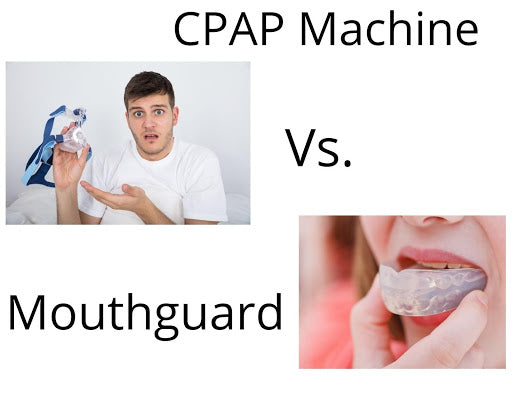Do you feel fatigued and unrested even after a full night of sleep? Does your partner hear you gasping for air or snoring throughout the night?
If so, you might be suffering from a form of sleep apnea. Following a sleep apnea test, a sleep specialist will provide you with a recommended form of treatment to help you receive the airflow you need while sleeping.
Today the team at ApneaMed is here to walk you through two different treatment options — CPAP therapy or a mouthguard.
What Is CPAP Therapy?
If you’re suffering from sleep apnea, you’ll experience cessations in breathing through the night that will leave you gasping for air. This happens because the muscles in your throat are relaxed and collapse, blocking your airway. To combat this blockage, many patients rely on CPAP therapy.
A CPAP machine, also known as a continuous positive airway pressure machine, is the most common treatment option for obstructive sleep apnea. This is because the breathing machine provides constant air to your lungs all night long to ensure you’re getting the airflow you need.
The pressurized air is delivered through a mask and into the patient’s nostrils and down the throat to ensure the individual’s airway doesn’t collapse. They’re able to receive the air needed to breathe continuously.
Although CPAP is proven to work and can help you feel more rested during the day, some patients can have discomfort. This discomfort is often a result of the continuous pressure in their airway all night.
How Does a Mouthguard Treat Sleep Apnea?
An alternative to a breathing machine is a mouthguard known as an “oral appliance” the patient wears while sleeping. The mouthguard works to relieve your sleep apnea symptoms by moving your jaw slightly forward, increasing the airway’s size — making it easier for you to breathe.
This oral appliance should be custom fit by a dentist to ensure a snug fit that offers the support your jaw needs to keep your airway from collapsing. If your mouthguard isn’t fit correctly to your mouth, you could end up with jaw pain or movement of your teeth.
When Is a Mouthguard the Best Solution?
While a CPAP machine is the most common treatment, that doesn’t mean it is the right option for everyone. Oral appliances are an excellent alternative for sleep apnea patients that have:
- Mild to moderate throat collapse issues
- Weak reflex response of throat muscles
Those with more severe forms of obstructive sleep apnea will feel more relief from a CPAP machine.
Testing and Treatment for Obstructive Sleep Apnea
If you suspect you have sleep apnea, a sleep specialist can help you navigate the process of testing for sleep apnea and determining the best treatment plan. If the sleep study concludes that you have sleep apnea, your physician can recommend a mouthguard or CPAP therapy, depending on your condition’s severity.
If you’re interested in learning more about the different sleep apnea treatment options, contact ApneaMed today.

